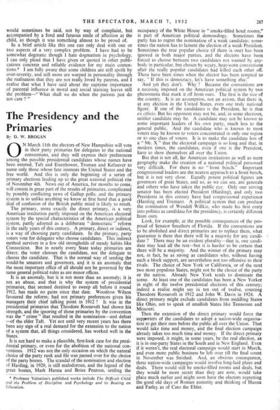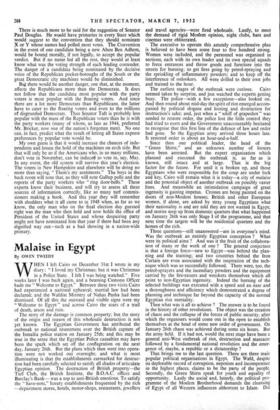The Presidency and the Primaries
By D. W. BROGAN
ON March 1 1 th the electors of New Hampshire will vote in their party primaries for delegates to the national conventions, and they will express their preferences among the possible presidential candidates whose names have been entered, Taft and Eisenhower, Truman and Kefauver to name only those whose fate interests the United States and the free world. And this is only the beginning of a series of primary elections leading up to the great national political rite of November 4th. News out of America, for months to come, will consist in great part of the results of primaries, complicated by possibly conflicting news of Gallup polls; and the primary system is so unlike anything we know at first hand that a good deal of confusion of the British public mind is likely to result.
The primary, more exactly the direct primary, is a very American institution partly imposed on the American electoral system by the special characteristics of the American political system, partly adopted as a deliberate " democratic " reform in the early years of this century. A primary, direct or indirect, is a way of choosing party candidates. In the primary, party voters vote for delegates who choose candidates. This indirect method survives in a few old strongholds of steady habits like Connecticut. But in nearly every State today primaries are direct; the voter chooses the candidate, not the delegate to choose the candidate. That is the normal way of seeding the would-be senators and governors, and it is an anomaly that the most important office of all should not be governed by the same general political rules as are minor offices.
It is an anomaly, but it is not more than an anomaly; it is not an abuse, and that is why the system of presidential primaries, that seemed destined to sweep all before it round 1912, has made no gains since that date. Woodrow Wilson favoured the reform; had not primary preferences given his managers their chief talking point in 1912 ? It was in the presidential primaries that Theodore Roosevelt had shown his strength, and the ignoring of those primaries by the convention was the " crime " that resulted in the nomination—and defeat —of the elder Taft. Yet not until very recent years has there been any sign of a real demand for the extension to the nation of a system that, all things considered, has worked well in the States.
It is not hard to make a plausible, first-look case for the presi- dential primary, or even for the abolition of the national con- ventions. 1912 was not the only occasion on which the natural choice of the party rank and file was passed over for the choice of the party bosses. The scandal of the nomination and election of Harding, in 1920, is still malodorous, and the legend of the great bosses, Mark Hanna and Boies Penrose, settling the • Professor Valentine's published works include The Difficult Child and the Problem of Discipline and Psychology and its Bearing on Education. occupancy of the White House in " smoke-filled hotel rooms," is part of American political demonology. Sometimes the party has to regret the nomination of a weak candidate; some- times the nation has to lament the election of a weak President. Sometimes the true popular choice (if there is one) has been ignored in both major parties, and the electors have been forced to choose between two candidates not wanted by any- body in particular, but chosen by weary, heat-worn conventions after the really popular candidates had killed each other off. There have been times when the elector has been tempted to say, " If this is democracy, let's have something else."
And yet they don't. Why ? Because the conventions are a necessity imposed on the American political system by two phenomena that mark it off from ours. The first is the size of the country. It is an assumption, not an axiom, that there is, at any election in the United States, even one truly national figure. If one of the candidates is the President, he is that ex officio. But his opponent may not be, and, in some elections, neither candidate may be. A candidate may not be known to some important leaders of his own party, much less to the general public. And the candidate who is known to most voters may be known to voters concentrated in only one region or to one class of voters. It is to make the candidate less of a " Mr. X " that the electoral campaign is so long and that, in modern times, the candidates, even if one is the President, have to show themselves all over the Union.
But that is not all, for American institutions as well as mere geography make the creation of a national political personnel very difficult. For there is no " front bench." Important congressional leaders are the nearest approach to a front bench, but it is not very close. Equally potent political figures are governors of great States, and so, as we can see, are generals and others who have taken the public eye. Only one serving senator has been elected President (Harding), and only two Presidents in this century have had congressional experience (Harding and Truman). A political system that can produce the nomination of Wendell Willkie, who made his first entry into politics as candidate for the presidency, is certainly different from ours.
Look, for example, at the possible consequences of the pro- posal of Senator Smathers of Florida. If the conventions are to be abolished and direct primaries are to replace them, what guarantee is there that there will be a majority for any candi- date ? There may be an evident plurality—that is, one candi- date may lead all the rest—but it is harder to be certain that there will be a majority. And the winner of the primary may not, in fact, be as strong as candidates who, without having such a block support, are nevertheless not too offensive to their rivals. The choice of New York or California, or of the next two most populous States, might not be the choice of the party or the nation. Already New York tends to dominate the scene. At least one of the candidates has been a New Yorker in eight of the twelve presidential elections of this century; indeed a realist might say in ten out of twelve, counting Theodore Roosevelt in 1912 and John W. Davis in 1924. A direct primary might exclude candidates from middling States like Ohio, not to speak of smallish States like Tennessee and Missouri.
Then the extension of the direct primary would force the supporters of the candidates to adopt a nation-wide organisa- tion to get their men before the public all over the Union. That would take time and money, and the final election campaign already takes too much time and money. If the direct primary were imposed, it might, in some years, be the real election, as it is in one-party States in the South and in New England. Even if it weren't, the real electoral campaign would start in March, and even more public business be left over till the final count in November was finished. And, an obvious consequence, these nation-wide campaigns would involve long-laid plans and deals. There would still be smoke-filled rooms and deals, but they would be more secret than they are now, would take place much earlier and might soon have the electors regretting the good old days of Roman austerity and thinking of Hanna and Farley as of Cato the Elder. There is much more to be said for the suggestion of Senator Paul Douglas. He would have primaries in every State which would suggest to the convention that they should nominate X or Y whose names had polled most votes. The Convention in the event of one candidate being a new Abou Ben Adhem, would be bound morally, if not legally, to accept the popular verdict. But if no name led all the rest, they would at least know what was the voting strength of each leading contender. The danger of a candidate being nominated by the decisive voice of the Republican pocket-boroughs of the South or the great Democratic city machines would be diminished.
Bj there would be another danger, one that, at the moment, affects the Republicans more than the Democrats. It does not follow that the candidate most popular with the party voters is most popular with the floating voters. And since there are a lot more Democrats than Republicans, the latter have to cater to the floating voters and even to the millions of disgruntled Democrats. Thus Senator Taft is probably less popular with the mass of the Republican voters than he is with the party workers (many of whom, as late as 1944, preferred Mr. Bricker, now one of the nation's forgotten men). No one can, in fact, predict what the result of letting all States express preferences by popular vote would be. My own guess is that it would increase the chances of inde- pendents and lessen the hold of the machines on each side. But that will only be so if the Americans who, in so many millions, don't vote in November, can be induced to vote in, say, May. In any event, the old system will survive this year's election. The voters in New Hampshire'and elsewhere will be doing no more than saying, " Them's my sentiments." The boys hi the back room will note that, as they will note Gallup polls and the reports of the party workers who " ring door-bells." These experts know their business, and will try to assess all these sources of information correctly, like so many turf commis- sioners making a book. And this year they will remember with shudders what it all came to in 1948 when, as far as we know, the only man who on the final election day guessed right was the man who then held and now holds the office of President of the United States and whose despairing party might not have nominated him that year if there had been any dignified way out—such as a bad showing in a nation-wide primary.



































 Previous page
Previous page